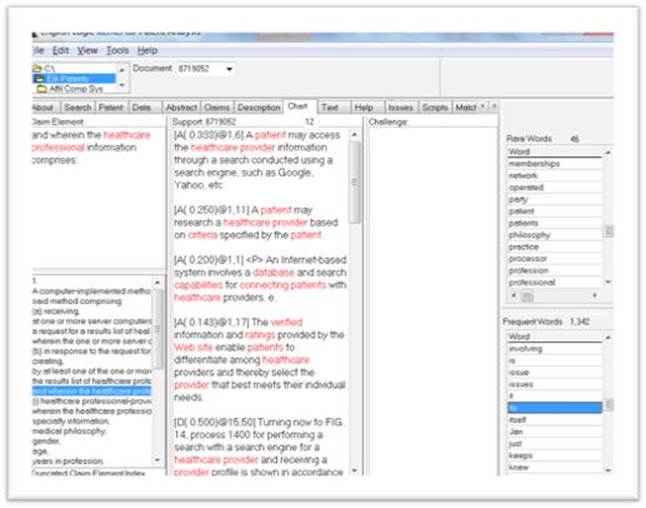Dear John,
Your original post is interleaved below with my responses.
You are thinking about patents in a moral way, rather than a legal way. Law doesn’t do morality, and neither do politics or business.
The overriding concern behind patent law is that business entrepreneurs are planning to put money and people to work on a specific implementation of a specific set of circumstances. If you want more new businesses, and better patent decisions, you should be for improving the life of patent examiners in a way that makes their job easier to do “correctly”.
It would seem to me that an empirically developed set of concepts, perhaps with enough knowledge mining automation, could produce an ontology of all known patents relevant above some threshold, to the candidate patent.
The right tool is shown below in one of its many aspects.

More information is at:
www.EnglishLogicKernel.com/Help/help.htm
The knowledge could in truth be developed by the USPTO based on existing patents, in layers of ontologies. The tool Patent Examiners Workbench was developed to allow any user to create an ontology, or at least a concept map, of the specific patents they examine every day.
That ontology, organizing the details about how the patent’s implementation, will be constructed automatically given the patent number and the claim vocabulary will help the examiner focus on the few best candidates. That will help the examiner finish each office action, or termination, or issuance with more depth of focus into the patent.
One of the many things that have been shown correct is that each examiner, each judge, each attorney, each client, and each expert witness work in a team, by court rules of debate, to discover the important issues for each litigation. That is why one ontology is not a realistic expectation in the PTO processes.
-Rich
Sincerely,
Rich Cooper
EnglishLogicKernel.com
Rich AT EnglishLogicKernel DOT com
9 4 9 \ 5 2 5 - 5 7 1 2
-----Original Message-----
From: ontolog-forum-bounces@xxxxxxxxxxxxxxxx [mailto:ontolog-forum-bounces@xxxxxxxxxxxxxxxx] On Behalf Of John F. Sowa
Sent: Friday, September 03, 2010 1:41 PM
To: ontolog-forum@xxxxxxxxxxxxxxxx
Subject: Re: [ontolog-forum] Patent application for using a formal ontology in NLP
On 9/3/2010 4:06 PM, Cameron Ross wrote:
> I wonder how those in commercial enterprises, such as Cycorp, are
> viewing this patent. Given (what I believe to be) the volume of prior
> art, is this patent a real threat within our community, or is it merely
> a distraction?
Note that this application is a "continuation" of a previous patent that
had been granted. If they got it through the patent examiners the first
time, it's quite likely that they could get this one approved with more
claims added.
No, the first specification’s earliest date (filed in the previous patent) can be recast with new claims using the same filing date in a patent ONLY if all needed support of embodiments are in that first patent.
Otherwise, a second continuation must add text to the specification, but no claim objects can be based on the ADDED text. So it’s a pretty reasonable process predicate as already practiced.
Re Cyc: You should ask them.
People who don't have much money, such as academic researchers, rarely get sued. But companies often use patents to handicap or destroy competitors.
Business involves a commons, which is different for each market. Businesses compete by distinguishing their offer from their competitors. Consumers choose the ones they want. Each market sharing competitor must work with other parties (suppliers, service providers, customers, employees, etc.) That requires investment, and once they have a self interest in their patents, they use their business strategies and tactics to navigate through the patent market.
That is the top level reality of the patent world. Of course each patent owner wants to maximize his earnings; of course the patent owner will not allow another party to infringe the patent unless they buy a license. Of course the patent owner may choose not to let another party infringe at all.
For some horror stories, see the following talk by
Richard Stallman,
http://www.cl.cam.ac.uk/~mgk25/stallman-patents.html
Some people dismiss Stallman as an extremist, but those who get sued for using prior art that is in the public domain can lose quite a lot of money in a lawsuit, even when they win. Note that these "inventors" assigned their patent to a larger company, which was bought out by an even larger company.
Reading Stallman’s critique, I noted that it is with the European patent system, not the American system. Their business laws, regardless of patents, cause the effects that he is discussing.
The American system is simply different in so many laws that there is no comparison between the two which enlightens.
There was an attempt to maintain the original American system, but the large financial forces caused “reforms” to the patent laws and to the consequences in business law which Judges must enforce. Since the new first-to-file law has only been in place a year or so, wait to see the evidence before concluding your thought process too early.
John
-Rich
